1990:August-December
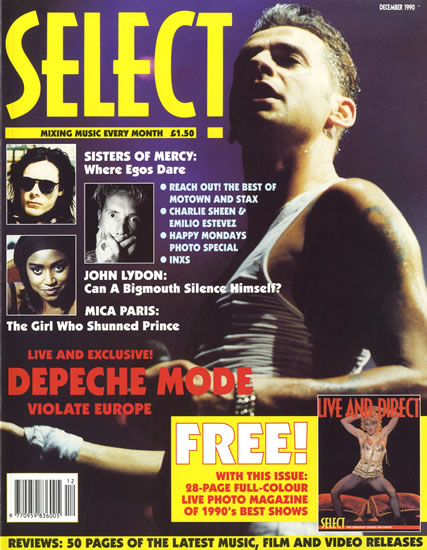
Select December 1990 issue cover
LIVE REVIEWS
DEPECHE MODE SHOW IS STUDY IN
YOUTH CULTURE, MARKETING
Dodgers Stadium, Los Angeles - August 4-5, 1990
Supported by Electronic
World Violation Tour - US and Canada leg
"Banners bearing images of roses flanked the massive stage erected at Dodgers Stadium on Saturday. As it turns out, the flowery graphics were symbolic of Depeche Mode’s music and performance – a thing of beauty with more than its share of thorns.
The show, the first of a two-night engagement, served as an intriguing study in marketing and youth culture. Though Depeche Mode has sold millions of albums worldwide, the band still enjoys an outlaw, "underground" reputation among many of its fans.
Maintaining such misconceptions is of utmost importance to "post-modernist" pop bands, since the snobby genre often frowns on anything too accessible. Well aware that appearing too successful could ruin its fortunes, Depeche Mode has, apparently, taken marketing precautions that border on genius.
Though the band’s new "Violator" album has sold nearly 2 million copies in the U.S. – not to mention the fact that the band sold out the Rose Bowl its last time in Los Angeles – some fans cried sellout when the two Dodger Stadium performances were announced. To help quell the complaints, the band hastily booked a performance at the more intimate Universal Amphitheatre on Wednesday "for fans".
To further diminish the appearance of seeming too successful – and thus, implicitly, too complacent – the band invited a post-modernist trio named Nitzer Ebb along for the tour. For those of you unfamiliar with Nitzer Ebb, the band plays music so abrasive, listeners feel their skin is being vigorously scraped with sandpaper.
The Dodger Stadium show also marked the debut of Electronic, a techno-pop supergroup featuring members of the defunct-but-legendary Smiths, as well as personnel from New Order and the Pet Shop Boys. Though the band’s music boasted a certain soothingness, its static performance left much to be desired.
Then came Depeche Mode’s set which, as always, was spotty. It’s immediately apparent why Depeche Mode is the most popular band of its ilk. The band’s music can be both appealing and horrifying in its desolate beauty and funkiness. One performance in particular Saturday, the eerily gorgeous "Waiting For The Night", gave one goose flesh.
What’s more, singer Dave Gahan is one of rock’s most graceful performers, combining moves from celebrated rockers like Elvis Presley, Mick Jagger, Prince and Axl Rose.
Yet after a while, the band’s Germanic music all washed together. Depeche Mode approaches nearly every song the same, and the lack of variation proved numbing.
The show was hampered by questionable ethical judgments as well, especially for a band that takes pride in its counter-culture repute. In a crass exhibition of greed, vendors passed out mail-order slips for Depeche Mode merchandise. This despite the fact that "DM" products were already being hawked on the Stadium premises.
The professed concern "for fans" displayed by staging the impromptu Amphitheatre show was missing Saturday. Gargantuan, closed-circuit television screens usually are provided at most stadium concerts nowadays, but none were supplied at Saturday’s show.
When fans in the upper balcony began pelting people below with toilet paper, food and drinks, no spokesperson for the band appeared to try and put a halt to the bizarre food fight. Some KROQ-FM DJs were assigned the unenviable task of calming the crowd."
Bruce Britt
L.A. Life, 6th August 1990
Reprinted WITHOUT PERMISSION for non-profit use only.
"Depeche Mode planned their tour to cap out of the United States with these pivotal concert appearances in Los Angeles. Why? For Depeche Mode there is no town more important than Los Angeles, since in Los Angeles there is no show more important than Depeche Mode.
The electronic existentialists' greatest asset is their ability to lend a melodramatic importance to a quiet suffering endured by much of this adolescent audience. Fractured families, indifferent parents, and a general high anxiety for their futures is the driving force for much of the crowd's fanaticism. The typical DM song ain't saying Life Is Grand, and while the rest of the nation rots its teeth on the New Kids, Los Angeles is moving to the dance of the disenfranchised.
But tonight the disenfranchised must first witness the debut appearance of Electronic before their conquering heroes can work their cathartic charm.
Electronic begin slowly with [Bernard] Sumner, [Johnny] Marr and three others working through a couple of dance tunes, sounding not unlike to New Order. But just as dusk begins moving into some serious darkness, the Pet Shop Boys trot on stage to join the band in presenting "Getting Away With It". The mood is magical and we hardly notice Neil Tennant's endearing bald spot. The groove is good and with only a single 12-inch to be familiar with, Electronic are surprisingly adept at winning the crowd over.
It's hard to imagine anyone screaming lustily at four wee lads from Basildon, but tonight Los Angeles is not complacent about its obsession. The set kicks off with "World In My Eyes" and a dazzling light show. If bands get the audience they deserve then Depeche Mode must do a lot of charity work in their spare time to deserve this kind of audience participation.
David Gahan has become quite the showman - spinning, roving and shouting, he's a sparkplug of energy. Even more to his credit, he never once shoots a dirty look at the other three, whose activity level climaxes with handclaps over the heads while standing behind their keyboards. David's only relief comes mid-way through when Martin Gore plays two acoustic numbers on his seemingly out of place guitar.
The show's best segment comes when Depeche Mode indulge in four successive hits - "Policy Of Truth", "Enjoy The Silence", "Strangelove" and "Personal Jesus". Many of the songs are accompanied by specially prepared videos, faithfully furthering the quartet's wry 'tortured artists' image.
Two encores, and the entire show is CD perfect, the ideal opportunity to witness 50,000 maniacs having one hell of a good time."
Craig Schmidt
Sounds, 18th August, 1990
Reprinted WITHOUT PERMISSION for non-profit use only.
SINGLE REVIEW
WORLD IN MY EYES - released September 17, 1990
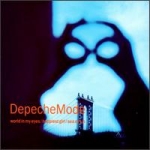
"And now a word from Nick Cave's sponsors. 'Violator' is platinum massive, and demands grudging respect from those of us not often moved by the compu-dance beat they have made their own. One of the true plusses of Depeche Mode's rise and rise is that their urge to experiment has not dissolved as they stare ever-deeper into the great black hole of the American mainstream. If anything, it is stronger than ever, judging from this wildly reshaped 12-inch and comparing it to the punk-pop 'cred' of something as ancient as 'Just Can't Get Enough'. Still, taking many soundcues from Kraftwerk, they and their posse of appointed master-mixers are surpassing themselves. No sign here of a shift to black dance patterns but, then again, no need - haven't DM's best works always been cut-up in the House anyway?"
Unknown reviewer
New Musical Express
Reprinted WITHOUT PERMISSION for non-profit use only.
ARTICLE
FAITH, HOPE AND DEPRAVITY
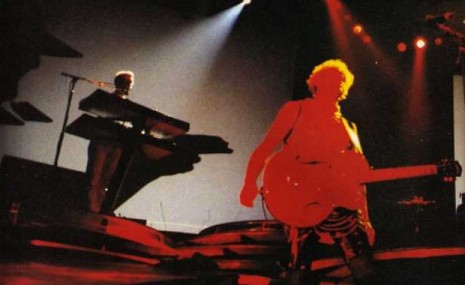
by Andrew Harrison
Select, December 1990
_____
This month Depeche Mode play Britain for the first time in an extraordinary year. Their four million selling 'Violator' has turned them into the biggest new British band in the world - but international stardom has its price. Are Depeche Mode becoming a digitally-sampled Spinal Tap? Select caught the World Violation tour in Germany to find out. Story by Andrew Harrison. Photos by Ed Sirrs.
DAVID Gahan is waiting for the night to fall. His band Depeche Mode have been onstage at the Dortmund Westfalenhalle for some 20 minutes now, before 17,000 feverish people in a towering sports stadium that resembles the torture chamber at the end of Terry Gilliam's movie Brazil.
Yet far from being dwarfed by the vast size of the venue, Depeche Mode's spartan bedroom electronics and bass imperatives have stretched out to fill the place, to subdue it and make it theirs. With 'World In My Eyes' and 'Never Let Me Down Again' the damage has been done. Now it's time for a change of pace.
As photographer/video director Anton Corbijn's monochrome images of stars and planets appear on the screens behind them, 'Waiting For The Night', the sepulchral centrepiece from their current 'Violator' LP, floods into the Westfalenhalle on a rich, black tide. It's a song of faith in oblivion, a drumless and insidious wash which surrounds Gahan's voice like the gathering darkness itself. A sharp contrast to the upbeat singles that opened the show.
For many fans, this is the side of the band that they really want to hear, the one that takes a host of half-formed teenage nihilistic fixations and replays them with Depeche Mode's characteristic veneer of detached sophistication. Yet as Gahan sings "I'm waiting for the night to fall I know that it will save us all", something peculiar takes over the young German audience.
As if experiencing a simultaneous Pavlovian response to minor chords and sonority, they hold their cigarette lighters aloft in suspension - at least five thousand of them swaying in blackness, for all the world as if this were a Barry Manilow show. "When everything's dark, it keeps us from the stark reality," intones Gahan and the lighters sway away, illuminating the fans' home-made banners. One of them declares, Martin You Are My Personal Jesus.
It's touching. They do it again later when the band perform the incomparably darker 'Black Celebration's "Let's celebrate the fact That we've seen the back Of another black day". But it sure isn't Depeche Mode. There's no doubt about it - Gahan, Martin Gore, Alan Wilder and Andrew Fletcher have come an appallingly long way since the microprogrammer days of 'The Meaning Of Love' and 'Just Can't Get Enough', when the papers laughed and said they looked like a bunch of hairdressers from a Carry On film.
These days they're totems of teenage sexual neurosis in Ray-Bans, corrupters of international youth and the only people to sell the vaunted sonic metal disco sound of the mid-'80s and still retain their credibility. Some people believe they invented house music. They have arrived, but the question is, arrived where?
A GRUBBY town wreathed in the accumulated smog and gunge of its steel industry, Dortmund is to Germany what Widnes is to England. This weekend it heads the second and third dates on the European leg of Depeche Mode's World Violation, the tour that, with the astonishing 'Violator', finds them finally and undeniably admitted to the Premier Division of international acts.
'Violator' has already shifted four million copies worldwide, and trebled Depeche Mode's usual British album sales. World Violation's two months in the USA saw the band's previous cultish appeal translate into almost two million sales of the LP, and a million of its entrancing single 'Enjoy The Silence', which was still in the Billboard Hot 100 in mid-October, six months after its release.
So quickly did Depeche Mode's American underground go overground that it even took the band by surprise.
In April they did a low-key record store promotion in Los Angeles to coincide with the albums' release, expecting maybe a couple of thousand fans to turn up. Instead some 15,000 autograph-hungry Depechlets appeared, creating frightening prospects of a crush. The band were terrified to see that the sheer weight of their fans was enough to make the store's plate glass window bend inwards. Finally, local police (who estimated the crowd at an astonishing 30,000) cleared the area.
On the other side of the Atlantic, fans snapped up tickets for the 40 European dates of World Violation while the ink was still wet, and though Depeche Mode arrive in Britain on November 19, their six British dates likewise sold out instantly. In 1990, three Depeche Modes would not be enough to sate the demand, and the band are accordingly in high spirits.
As if to match their increasing stature, Depeche Mode on the road has become much more of a rock 'n' roll affair. The band's aptitude for hard partying is no secret, but to the apparent embarrassment of British friends and colleagues from Mute Records (the independent label which has been home to Depeche Mode since their first single, 'Dreaming Of Me', in 1981), they have of late increasingly found themselves surrounded by an unwanted coterie of hangers-on, plantpots and users from foreign record companies and promotion agencies. At least one such character inveigled himself into their company on the Dortmund weekend, in search of a little reflected glory, and, polite Basildon lads that they are, Depeche Mode weren't inclined to see him off.
More than ever, the fans too have grown fanatical, staking out every hotel in town and seemingly able to smell an Englander a mile off.
This slow and unwilling gravitation towards Spinal Tapism is a quaint irony given Depeche Mode's ancient connections with the supposedly 'anti-rockist' new pop of the early '80s, and their subsequent alignment with the equally guitar-free avant garde metal noise brigade. There is even a sizeable meathead contingent 'down the front' these days, much given to chanting "Dee-pesh!" in terrace style and giving the support band Electribe 101 a hellish time.
The band has acknowledged its new status as the portable Donington of the Casio generation by dressing its roadies in an official T-shirt which reads DEPECHE FUCKIN' MODE.
Yet membership of the top flight has its privileges. Chief among them is the ability to play fast and loose with the international press. You get what you're given with Depeche Mode, and for MTV Europe that means the opportunity to film 30 seconds - 30 seconds - of the second Dortmund show. Try editing that into broadcastable shape.
Reporters get a pretty fair 45 minutes with whichever band member feels like talking. Today it's Depeche songwriter Martin Gore, a relaxed but slightly evasive man with a bleach-blond Eraserhead haircut and a preternatural golden suntan, who opens his hotel room to the world.
"Who said this life isn't glamorous?" he smiles, gesturing at the sodden cityscape outside his window. It looks like bad news.
"Dortmund on a rainy Sunday. It's so much more enjoyable playing in America cos you've got generally nicer weather and usually somewhere interesting to look at, rather than this place in the middle of a motorway - there isn't even a hotel shop.
"But it's funny really," he muses. "I've noticed that the European audiences are much more responsive than the Americans this time..."
Responsive is hardly the word. Obsessive, more like.
"Yeah, it's obviously very flattering but it's worrying too," Gore replies. "People feel that they have a very special relationship with us, particularly in America where we have...not a small following, heh heh, but certainly a cult one. We've always got our airplay from the college stations and the alternative broadcasters.
"Americans more than anyone have suffered from ten years of Toto re-runs, and I suppose we came along at the right time with a new sound. Plus they didn't have the preconceptions of us that English people, who know us from 'A Broken Frame' when all our youthfulness was on show, have.
"I think it's down to the intimacy of the music. People feel that the songs are personal to them. And though there is an element of contradiction when you play a concert like last night's, with 17,000 people going mad, that intimacy is still there. People still feel moved by it, they feel that it's theirs.
"Me and Andy did a phone-in at a Top 40 station in New York this summer, and one of the callers asked, What are you doing on this station? They don't have the right to play your music, this is a tacky station!
"They still feel that Depeche Mode is their cult thing, that the music shouldn't ever go mainstream no matter what it sounds like and no matter what we do."
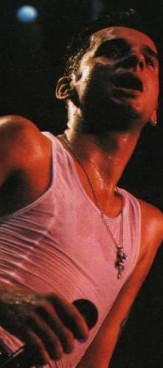
THREE years ago, before 'Violator', they might have been right. Gore confesses that the band's previous studio album, 1987's 'Music For The Masses', was the end of the line for one particular kind of Depeche Mode - the one that generated pre-House iron-foundry dance music in the vein of continental experimentalists like Einsturzende Neubauten and the British metal-bashers Test Department.
The sound had been caricatured as callow pop dilettantism, but it yielded at least three pearls of singles in 'Master And Servant', ' Everything Counts' and even 'People Are People'. Depeche Mode's lyrical purview had shifted as well, from the concerns of the Just 17 problem page to, well, Skin Two. Out went unrequited love, in came "You on top and me underneath."
"We had perfected a formula by then," Gore says, "and it came to fruition on 'Music For The Masses'. But our sales had become stagnant. We'd sold exactly the same number of albums each time since 'A Broken Frame' (their second, in 1982).
"We realised that if we were going to advance, if we were going to make another record at all, then we would have to change. We needed a new approach, otherwise we wouldn't have been challenging anything."
So not only did the band leave behind its increasingly dated marriage of abrasive sampling and upfront pervery, but they also junked a whole method of working.
"In the past I'd always demo-ed the songs at home and presented them to the band in quite finished form," Gore explains. "By that stage your ideas are pretty fixed, so we had tended simply to copy the demos, to make them better.
"But this time the band asked me to keep the songs as basic as I could. Sometimes it would just be guitar and vocal, or organ and vocal. We had no preconceptions and we didn't spend any time on pre-production, whereas we'd usually spent, say, six weeks in a programming suite working things out.
"This time we took these very basic songs into the studio and tried to do it very spontaneously. For instance, 'Enjoy The Silence' began as just an organ and my voice, and Alan had this idea of giving it...well, not a House groove but a dance groove..."
('Dance' being the favourite euphemism of people who want to make House records and not get stick for it, viz everyone from Happy Mondays to the dear old Style Council. Martin is oblivious to this.)
"...And I was very wary of this at first. I thought the very nature of the song was, you know, enjoy the silence, so it ought to have a very serene atmosphere. It took me a while to get used to the idea, but as we took it further that way with the guitar riff, it really pulled together.
"There were times when it didn't work, of course. 'Policy Of Truth' we recorded several times in different directions and it just didn't work. A lot of the songs were like that. So by supposedly being more spontaneous we ended up spending more time in the studio."
'VIOLATOR' proved to be the album on which Depeche Mode began to flex muscles they didn't know they had. Compared to the spent electronic clatterings of 'Music For The Masses' it's a lush experience, a seductive alternative route to the heart of darkness that Depeche had spent the '80s seeking. Gahan's voice, often smothered by overblown percussive mayhem on previous albums, fills out songs like 'Halo' and 'Clean', which appeared on Select's first Red Tape cassette.
And perhaps for the first time, Depeche Mode sound like they're not just toying with the solipsistic alienation groove that sustained them for the past ten years, when it seemed they were merely pushing themes of sado-masochism ('Master And Servant', 'Strangelove'), infection ('Shake The Disease') and religious weirdness ('Blasphemous Rumours') to see how much chart programmers would take.
When Gahan sang "I give in to sin/Because I like to practice what I preach" on 'Strangelove', you could never quite believe him. But 'Violator' presents the real stuff, shorn of adolescent trappings at last.
'Personal Jesus' is a horrifying song of private desperation meeting messianic egotism, with Gahan as "Your own personal Jesus Someone to hear your prayer" over a mutilated Glitter Band beat. Unlike Depeche Mode's prior ingenious forays into such territory, 'World In My Eyes' and 'Enjoy The Silence' draw deceptively radio-friendly portraits of love's undercurrents of dominance and submission. And the clammy voyeurism of 'Blue Dress' owes more than a little in texture and subject matter to David Lynch's Blue Velvet.
But despite all this, despite its queasy undertones of disgust for the flesh, and despite a title that reeks of sexual threat, 'Violator' is a downright sexy artefact - all the more so for its refusal to shy away from the dark side of human sexuality.
It's vignettes of love on the edge and minds in the gutter make it strong stuff for the pop context. But Martin Gore founders when asked to pinpoint why these disturbing themes have found such a wide audience.
"I just write about things that affect me...I always have done," he protests, with some exasperation.
"I find it very unappealing to write songs that are safe, that go nowhere, that do nothing. When I sit down to write a song I don't know exactly what my intentions are. I just set out to try and capture an emotion in a song. I know that 'Clean' has a lot of holy imagery, and that intertwines with the sex theme, which are two ideas I find interesting to mix together. But I don't try to analyse things."
Yet these are songs with a very definite and sometimes very perverse, downbeat identity of their own.
"Well, I think a lot of people are taken in by the myth that our music is totally bleak and desolate. Steve Wright, whenever he plays our records, says, I hate that band, aren't they the most depressing thing that's ever happened to music? Comments like that, people get taken in by. So I try not to let the pressure get to me, and I don't think about the consequences of a song."
Come off it. You must have expected some flak for 'Personal Jesus'?
"I thought it would get more than it did, really," he replies. "It was played all over Europe, America and England with no great trouble. The only problem was with the newspaper personal column adverts, which said 'Your own personal Jesus' and gave a telephone number.
"Imagine someone about to top themselves and they see it in the paper - my last saviour, my last chance. And it's Depeche Mode. Especially if they're a Steve Wright listener."
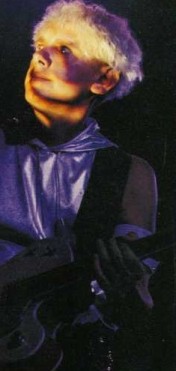
MARTIN'S dance euphemisms aside, 'Violator' is also the album where Depeche Mode finally find out what the hi-hat button is for. For the first time, there's a strong and undisguisable House pulsebeat in evidence throughout the LP.
Yet for a couple of years pundits have been keen to stress Depeche Mode's early input into House and techno. This culminated in a fascinating piece in The Face last year, which followed the band through Detroit clubland as they met techno innovators including Rhythim Is Rhythim supremo Derrick May. May revealed that Depeche Mode's approach to sampling, and their increasing prominence in European electronic music, had given him and his contemporaries on the cutting edge of dance music plenty of ideas.
The Face, however, trailed the story on its cover with the headline, Did Depeche Mode Detonate House? They didn't, of course, and no one was claiming they did. But the implication that they were claiming credit for creating the decade's most important musical form has dogged Depeche Mode ever since.
Martin Gore is sanguine about it all.
"We've been cited a lot in recent years as being this big influence on House music," he grins. "But I really think it was in our approach rather than the sound itself. In some ways we do push boundaries in music. We've always tried to be on the so-called forefront of technology, and I suppose the way we work has been quite influential. I even think it's helped, particularly in America, to change the whole format of music.
"But I don't agree that there are a lot of House references on 'Violator' - though you might say 'World In My Eyes' has a slight techno feel. And in some ways you can't help but be influenced by House - after all, it's played everywhere you go these days."
Like at Depeche Mode concerts, for instance.
For World Violation, the band has undertaken a rolling programme of renovation on some of their back catalogue. 'Behind The Wheel', the paranoid road song from 'Music For The Masses' which they perform as an encore, now boasts a mighty House breakdown as it segues into their idiosyncratic cover of 'Route 66'. And 'Everything Counts' has been restructured techno-style to devastating effect, demonstrating Depeche Mode's growing ease with more subtle dance forms.
But, believe it or not, World Violation is first and foremost a rock 'n' roll show on a panoramic scale. Perhaps it's just the volume, or the shock of finding such solitary music in a context of size and excess, but in 1990 Depeche Mode win by simple power. It's not simply stunning - at times it's frightening.
'Personal Jesus' is a case in point. On record it snarls and spits, the perfect antithesis to the redundant pretty-boy image of Depeche Mode that still lingers in British minds.
Onstage the song becomes monstrous. For 17,000 German kids, David Gahan becomes their personal Jesus. And anyone who can stand amid that, see their arms spread wide, hear them chanting "Reach out and touch faith" in unison, and say they're not worried, is lying.
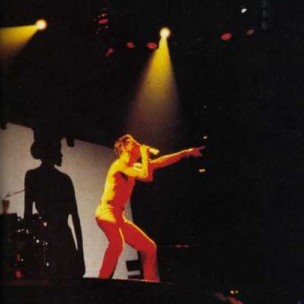
Reprinted WITHOUT PERMISSION for non-profit use only. Photos by Ed Sirrs reproduced without permission.
LIVE REVIEW
Wembley Arena, London - November 19-20 & 23
World Violation Tour - European leg
"Plinky-plinky!"
"A "stocky" bloke in white jeans and perv-o-sparkle glitter jacket! A fright-wigged blonge bloke in a chain-mail mini skirt! A bespectacled bloke who stands grimly behind a synthesiser! A bloke they call Alan "Wild"er! Yes, it's Depeche Mode, alright, up there amid the purple and green lasers that flash pertly to greet them as they meander onstage. Lead Mode Dave Gahan (the "stocky" one) glances regally at the crowd and launches into song without so much as a "Hey, London, are ya ready to raaawk?".
Greetings of this nature are unnecessary because Depeche Mode's audience is adoring to the point of obsession. For proof you only have to look at the guy near the front of the stage who's come out this cold November night without a jacket, to display his "Depeche Mode Convention - Camden Palace" T-shirt. And almost everyone else has visited the merchandise stands (there are three, for our comfort and convenience) and acquired sweatshirts and things, which are being floppily worn.
Up on stage, the Mode are rumbling through "World In My Eyes" as, behind them, pyramids of lights dizzily change colour. Then they do another song. And another. Depeche Mode have been playing the same sort of plinky-plinky electronic music for ten years now, and there's sometimes not very much to distinguish one glum-sounding hit from the next. Not that this bothers the audience, who roar along lustily to such champion tunes as "Everything Counts" and "Stripped".
The other three Modes stand around at the back of the stage, behind their keyboards (except for a dubious interval when the mini-skirted one, Martin Gore, dons a guitar and "treats" us to a few numbers), but Dave is a bit of a "one". Off comes the sparkly jacket, wiggle goes his bottom, up over his head goes the mikestand. Quite a contrast to their serious sounding music really.
Several of the songs are accompanied by arty (i.e. incomprehensible) videos of the coves in cowboy hats and holding sparklers. Dave continues to twitch his bottom wildly, the show finishes with a version of the hoary old Rolling Stones rawk tune, "Route 66", and the Mode gloomily drift offstage as the audience wander blissfully to the exit doors.
"Fantastic", sighs Depeche Mode Convention man. Hmmm..."
Caroline Sullivan
Smash Hits, 25th December, 1990
Reprinted WITHOUT PERMISSION for non-profit use only.